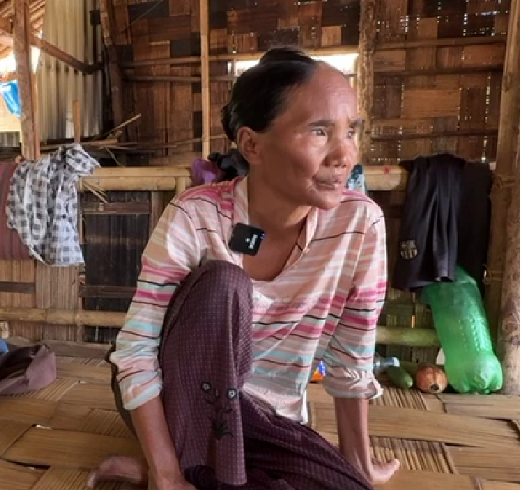An interview with Pi Thiampar, a 62-year-old ethnic Chin woman who has been seeking refuge there for over three years, at Tuirial refugee camp in Mizoram
Following the military coup in Myanmar on 1 February 2021, local residents have been forced to flee to neighboring countries due to the military junta’s human rights violations, acts of violence, and the ensuing resistance battles against the military dictatorship.
Among the areas affected by clashes between the junta forces and resistance groups is Set Kant village, located at the foothills of the Chin hills in Kale Township. Pi Thiampar, a 62-year-old resident of the village, witnessed her village being set ablaze by junta troops at least three times in 2023, leaving nearly the entire village reduced to ashes.
Among the homes destroyed in the fires was that of Pi Thiampar, an ethnic Chin woman. As a result of these circumstances, she has been taking shelter at the Tuirial refugee camp near Aizawl town in Mizoram State, along the Myanmar-India border, for over three years.
The Tuirial camp hosts more than 20 households and nearly 100 displaced people, according to available data. During her prolonged stay at the camp as a refugee, Khonumthung Media Group (KMG) conducted this interview with Pi Thiampar, now 62, to learn more about the conditions and challenges she has faced.
Q: Why did you end up coming to Mizoram State?
A: We fled on the morning of 10 April 2022, around 8am. (Junta) soldiers entered our village and started arresting the villagers. So, we ran away. We escaped to Sar Thaw village, but the fighting continued there too. From there, we fled again to See San village and stayed for about three nights.
We didn’t dare return to our own village. From See San, we moved on to the Tahan ward in Kale town and spent one night there. Then, from Tahan, we came here to Mizoram State to seek refuge. We didn’t bring any clothes or blankets with us—just whatever we were wearing. Up until now, we’ve been relying on clothes and blankets donated by others.
Q: I’ve heard that homes were burned down due to the military junta’s arson. Could you tell me more about that situation?
A: On 6 October 2023, some acquaintances told me that our house had burned down. Since we fled to this side without taking anything from the house, everything we owned turned to ashes in the fire. The soldiers were the ones who set it ablaze. There was nothing we could do about it. Everything we had went up in flames. When we first arrived here, we borrowed pots and pans from others to cook rice and meals.
Now, thanks to the help of kind donors, we’ve managed to get some small cooking pots and utensils. After our house burned down, we received 150,000 kyats in support from some donors, but that’s all. We didn’t get anything else. Others whose homes burned down earlier received some donations, but we got almost nothing.
Q: How do you make a living here at the IDP camp? What challenges do you face?
A: It’s extremely difficult. To be honest, my husband goes into the forest to chop firewood and then sells it. He earns about 200 or 300 rupees (Indian currency) a day, which we use to buy rice—one or two kilograms at a time—and that’s how we get by. I can’t do much myself, and there’s no one else here who can work either. Even when we’re unwell, we still have to keep going because there’s no one to rely on.
Chopping firewood in the forest and selling it brings in about 300 or 400 rupees. Sometimes, he works as a day laborer in the fields for 500 rupees a day, but that work isn’t always available. That’s how we keep surviving. As for me, I have a heart condition and no strength left. I can’t do much—just cook rice and meals. If I don’t take my strength medicine regularly, I can’t do anything at all.
Q: Since life here is such a struggle, do you ever feel a desire to return to your village?
A: Even if we wanted to go back, our house is gone—where would we sleep? Under someone else’s house? As long as they allow us to stay here, we’ll have to stay. But if they say, ‘We don’t want you anymore, go back,’ and kick us out, then we’d have to return. Our homes have turned to ashes, and we have nothing to rebuild with. Thinking about all this drives me nearly mad. Every time it crosses my mind, I feel like hanging myself. It’s only because religious leaders and friends have prayed for me that, with God’s help, I’ve been able to endure this far. If Mizoram decides they don’t want refugees anymore and expels us, we’d have to go back.
But where would we live? Thinking too much about it makes my heart condition worse—it feels like I’m going to die. So, I try not to think about it. We have nothing left, no house, nothing. When I dwell on it, I feel like a lunatic. There’s no one to rely on. I miss our village so much. I desperately want to go back, but I can’t. Even now, there are still soldiers in the village. We can’t do anything, can’t manage anything. I’m a true Set Kant villager, so I miss it even more and long to return even more.
I hope the People’s Defense Forces (PDFs) win quickly so we can go back soon. But even if we did, we have no house to live in, and we have nothing to rebuild with. Thinking about it makes me want to lose my mind. We’re surviving on small donations from benefactors. If there’s no support, we borrow a handful of rice from the church on credit. That’s how we keep going. Sometimes, we pick vegetables from the streams for our meals too.
Q: Some displaced people have family members abroad who help them out. Don’t you have anything like that?
A: We do have some relatives overseas, yes. But we don’t get any help or support from them. No one helps us. Just recently, I was unwell for about four days and didn’t have money to go to the hospital, so I just lay there. When I got a fever, I took some medicine. It’s only this week that I’ve started feeling better. Apart from God, there’s no one to depend on.
Q: Is there anything else you’d like to say?
Answer: I desperately want our country to recover soon. For older people like me, we don’t know when we’ll die. I don’t want to die as a refugee in someone else’s country. That’s why I hope Myanmar gets better quickly.


